还有吃。上次在南禅寺我讲过:你说人干嘛要吃呢?如果天人看人间,就和我们人到厕所里看那个蛆一样!蛆也在厕所里面,辛苦的经营着那一点点儿泥滩,那是它赖以生存的家。我们人也是这样。我们人每天搞一些乱八七糟的东西,粘粘糊糊的,都不知道咋整的。结果从这头儿进去,从那头儿出去。日复一日,年复一年,坚持的还挺好。而且好像这一辈子主要的目的,没有别的,就是为了从这个口儿进去,那个口儿出去,真没干别的!从出生到死亡,你看看你干什么了?把这个事儿干完了,也就完了!
Above all, we have to eat. Why should we eat? In the eyes of the celestial beings, we are no difference from the maggots in the stinky mire, who work hard to maintain their home no matter how dirty and stinky it is. As human beings, we are no better by eating and excreting rubbish day in day out. Actually, eating has almost become the only purpose for us. From birth to death, we really haven’t done anything more meaningful and decent. Only when our life is finished do we stopping eating and excreting rubbish.
你跑这儿来折腾啥呀?从生下来开始,就往里装,有的人装的还挺好:现在人越整越高档。过去吃苹果,树上摘儿下来蹭一蹭就吃了。现在这个苹果,拿来以后,要这样儿拿,叫什么兰花指!然后还得去皮、去核、加工,否则有菌。
What’s the significance of our life? It seems that we were born to enjoy food, nothing else. As a result, we are making the process more and more complicated: In the past, one would pick an apple from the tree, wipe off the dust and eat it as it is right away. Nowadays, however, we may go through many prudent procedures before we can enjoy the same apple. Firstly, we learn to take an apple in a decent and graceful manner. Next, we have to peel it and core it out. After that, we process it in different ways in order to make it degermed and more tasty.
其实怎么吃也都是这么回事:从这头儿装进去,然后从那头儿就出去了。装了一辈子,一点也没装住。最后,连自己身体都一块儿出去了!这都属于果报、苦报!
No matter how complicated the process has become, it is still the same that we put it in and excrete it out day in day out, with nothing left. Gone with it is our body at the end of our life. This is the karma, the negative karma we create.
但是我们很多人还很傲慢呢:我吃那东西,你们吃这东西!其实,这就是无明。三、五十年前,任何一个面食,你要能吃到油炸的,哎呀,你太令人羡慕了,很高档了!现在说油炸的是最差的,垃圾食品!
Some people are so arrogant simply because they can eat better food: Look, this is what I eat! Mine is undoubtedly better than yours! This is Avidya, ignorance. Decades of years ago, it was so admirable to be able to eat fried food, but now fried food is regarded as junk food, rubbish!
也不知道到底咋儿回事,反正就是莫名其妙的无明、无明心。反正别人的东西就是不好。这都属于无明,也是因为贪嗔痴,当然还有慢。我方才讲的就是一种慢心:我的东西就是好的,我有权力说我的好,你们就不好!至于哪个好,还不一定谁先死呢!
This is due to unreasonable and inexplicable ignorance, Avidya, all deriving from our greediness, resentfulness, delusion and arrogance. Which is better and healthier? Who knows! We can never be sure who die earlier despite the different food we eat.
这里讲的就是:我们众生为什么轮回。因为这个原因、这个行为,导致了苦。面对苦,又因为无明进一步造苦因,受苦果。在苦因苦果上,还因为无明,再进一步造苦因,再受苦果。所以,我们这个生命每时每刻都在一个苦果的平台上,重新造的因。
The reason for us to be attached to Samsara is that our ill-will and harmful behavior result in misery and suffering. When facing all these sufferings, we become more greedy and resentful, thus planting more bitter seeds which will surely bear bitter fruit. This endless cycle is based on Avidya, our ignorance about the law of life. Every minute, we are standing on a platform of bitter fruit, and at the same time planting new bitter seeds, waiting for more bitter fruit.
比如,我们今天有同样一个果报,来这里坐着听课。但是我们在这儿坐着的时候,以一个什么样的态度来听?是不是如理如法?你听课的时候在想什么?你是不是真的想从中搞明白一些生命的道理?真正有一个谦卑的心、学习的心、求知的心,想搞明白、搞懂、领悟的心?
Take today’s class for example. We attend the same class because of our common former karma, but our different attitude and mental state will make the result a big difference. Are you attending the class attentively with a modest and serious attitude? What’s in your mind when you are listening? Do you really want to understand the true meaning of life?
很多地方也有很多这样的人:他听课的时候,是一个审判官:“我来看看这个法师讲的行不行”!这就是另外一种态度。这样不同的态度,面对我们这个相同果报。果相同了----我们现在这儿学佛,都需要在这儿坐着,都需要在这儿听,这几个小时不能动。这都是果,我们果是平等了,几乎是一样。当然,我们位置不一样,前后距离还不一样。你选择的,这是因缘。但是大致是一样的果。可是,我们当下种的因还是有差别的:
Many people act as a judge when coming to the class. He’s simply interested in finding faults with the teacher: Is the teacher right? Is the lecture in accordance with his understanding? This kind of attitude makes the result completely different. The common and equal result for all of us is that we are attending the same class today and we must listen for hours. However, we are also creating different karma hereby.
咱们是不是有的人一边听一边想:“我家电饭锅是不是还没拔呢?他能不能把钥匙拿走了?”这也种因,将来也有果。就是这样因果因果,生命就用这种因果循环的过程,组成了我们生命的链儿。这种生命的链儿前无始后无终。这就像时间一样,时间无始无终;也像空间一样没有边际。所以我们这个生命也就这样,永远的这么轮回着。所以我们常说“从无始劫以来,我们就这样受着种种的苦,轮回到了今天”。
Someone here may still be worrying about such trifles: Did I turn off the electric cooker? Has he forgot the keys? Even such subtle things also create karma which one has to bear afterwards. Our life chain is formed in this karma of cause and effect retribution without a start nor an end. Just like the endless time and boundless space, we have been recycling in Samsara life after life. Therefore, we often say “We have been suffering in Samsara from beginningless time till today”
那么我们的生命有没有结束那一天呢?生命没有结束,但是生命也时时在结束。因为,方才讲了,它是一个因果的循环。那么这种苦可不可以断掉呢?苦是可以断掉的!这就要学习佛法,能够断掉苦的办法,就是佛法。
In spite of this, will our life end someday? To put it in an accurate way, we should say that our life will never end but it also ends every minute, because it has been attached to Samsara. Is there a way for us to abjure the miseries and sufferings? The answer is positive and definite and the only way to do this is to learn Buddha-Dharma.
所以我们学佛要干什么呢?就是要了解生命。要了我们知道了苦是这样来的,透过它我们就可以研究,我们怎么样让他不苦。根源在哪儿?无明,根源在无明,我们就解决无明。真正的去思考、真正的搞懂这种因果的关系。(因果和轮回是紧密联结在一起的。)
The purpose for us to learn and practice Buddha-Dharma is to learn about the law of life, to become clear where all the miseries and sufferings come from, and how we can stop all these negative Karma. Now we know all sufferings originate from Avidya, our ignorance of the law of life, consequently we should solve the problem of Avidya. In order to do this, we need seriously ponder on and know clearly about the karma, the relationship of cause and effect since karma is closely related to Samsara.
这里强调一下:我们每一个人心灵的状态什么样,就决定了你的快乐指数如何。心灵心胸广大、光明、坦荡,更广大的心,愿意去帮助更多的人,这样的人活着就快乐,就会有尊重,就会有福报。反过来,心胸狭隘、纠结、自私、烦恼,我们的生命就会越来越黯淡。特别是在这个过程中,就造各种冲突,各种恶业,去加剧自己的烦恼。这个就特别的苦!那么,关键的时候,他就会到下一个层次去活着。
Most importantly, our happiness index depends completely on our state of mind. A kind, generous, bright, optimistic and altruistic heart brings about more happiness, respect and good fortune. On the other hand, a selfish, narrow-minded, troubled heart results in a dark and unhappy life, which in turn creates a negative Karma and strengthens one’s vexation and sufferings. When the present life ends, he will fall down to a lower form of life.
人间的人也是这样,包括官位、职称等也是这样。当然,如果是很公平的话,那你有多大能力,就应该有什么样的地位(而事实并不总是如此)。
It’s exactly the same law with social status and professional ranks and titles, etc.。 We always take it for granted that we should enjoy different social status according to our capabilities, however, the reality is not always so.
我们是不是做人,也是因为我们这个心胸、心量的不同,也就是内心世界光明的程度不一样。所以,我们就会从这个六道中,得到不同的选择:心胸越狭窄、越纠结,这些问题越严重,他的位置就越低。这些问题小一点,他就相对高一点。就这样轮回的。尤其是在这一期生命结束的时候,决定你去哪儿,就看你心性、心灵的状态,也叫做觉悟的程度。再一个就是本性,一切事物,包括生命的本性,我们是不是掌握了?因为不掌握,所以我们就苦。我们要去掌握它!
Different states of mind also decide whether one will be a human. One’s life form in the six realms of karma depends on one’s state of mind. The more generous and bright one’s heart is, the higher his life form is, vice versa. At the most critical moment when one’s present life ends, one’s state of mind will decide where he goes. The state of mind is the degree of one’s enlightenment. Another major factor is whether we have clearly understood the nature of life. We suffer if we haven’t. Rationally, we should try to understand it and master it.
那么如何去掌握它呢?我们为什么这么久没有掌握它?我们大家现在分析一下,我们平常人认识这个世界,包括认识别人,靠什么来认识呀?靠眼睛、耳朵、鼻子、舌头,还有身体、触觉,即眼耳鼻舌身。还有什么呢?我们对外界再没有什么了。这个意识心是自己内在的东西了。我们去感受外在,去认识外界事物,就这么五个方面。而我们最依赖的是什么?第一个就是眼睛。所以有句话叫做“眼见为实,耳听为虚”。
How can we master the nature of life? Why haven’t we master it for kalpas. Let’s make an analysis about it: We perceive and understand the outside world on the basis of our five senses, eye, ear, tongue, nose and body, nothing else. Our consciousness belongs to the inner world. What we mostly rely on is the eye, just as the saying goes “Seeing is believing”。
但是我们这个眼睛有多么可靠呢?我们的眼睛,只不过是光的反射,是纯粹的一种物理的东西,物理学讲的一种结构。很简单,就是光反射过来,刺激一下神经,然后你有一个反应。用这么粗陋的一个设备,你想把这个世界真的看懂是很难的。其实还有一个很重要的现象,就是我们眼睛真正看到的东西,我们反而觉得以为是没有看见。我们没看见的东西却以为是看见了。
The key point is how reliable our eyes are. Scientifically speaking, our eyes are nothing more than a physical structure which reflects light. Our nervous system responds when light functions on our eyes. With such a course and simple equipment, it’s quite beyond us to accurately understand this world. Another important factor is that we often commit such blunders: When we genuinely see something, we feel that we see nothing. Vise versa.
我们想一下:我们的眼睛真正看到的是什么?空气是真正的看到了,而且看穿了。没看到的东西,我们以为是看到了。比方说这个墙,你看到了没有。我们都会说“我看到墙了”。其实我们真没有一个人能看到墙。我们只见到了墙和空气之间的界面。透过空气,看到了这个界面。真正的在里边,这是一层漆。这个漆的里边你都看不到,只看到一个界面。你如果能看到这个墙,是不是这个墙里装的什么你就知道了?那墙里面,如果藏一个金佛,还藏得住不?藏不住了!
Let’s think about this: What do our eyes really see? We see air and we see through it, but we don’t think we really see it. On the other hand, everyone thinks that we see the wall, but in fact we don’t really see the wall. What we see is only the interface of the wall and the air. We see the interface through air but we can’t see the inside. If we could see the inside of the wall, we would know what is inside the wall. If a gold Buddha statue was hidden inside, it would have been taken away.
以前在土地革命时期,很多有钱人把墙抠个洞,把黄金、珠宝都装到里面去,然后外面封上,贴上墙纸,人家就不知道了。如果我们要是能看到墙,那墙里面有黄金你就看到了,有珠宝你也看到了。所以我们其实是看不到墙的。我们看到的只是空气和墙这么一个界面。而我们按照推理、按照生活的经验确定:我们看到的这个地方是墙。这都是判断。就好像我们现在这些菩萨、罗汉下面这个墙,如果没有真正去碰过它的人,就这样看。你说它到底是纸做的,还是塑料做的呢?或者,真的是石头的吗?
In the 1950s, many rich people dug holes in the wall and hid all their valuables inside and sealed it with wallpaper. If we could see the inside of the wall, we would see all the treasures. From this fact we should know that we see nothing more than the interface of the wall and the air. However, our knowledge, life experience and reasoning logics tell us that we see the wall. This is a judgment instead of the truth. We don’t even know what materials the wall is made of. Is it made of plastics, paper or stone? We have no idea.
所以说。我们这个眼睛看事物是很容易被迷惑的。眼睛不可靠。因为眼睛的不可靠,耳朵、鼻子也同样是这个道理。所以我们看待这个事物,所能见到的都是一些表面的现象。这种表面的现象,让我们执着了,我们就没有办法去看见事物的本性。所以我们就每天被现象所迷。物质长什么样儿,是被眼睛给迷失了;声音的本质,我们听不到。我们听到的是一个波,我们还是被迷失了;触觉也是一样,软硬和它的本性不一样。我们看不到、感觉不到它的本性。
From the above, we know that our eyes are easily mistaken. Our eyes are unreliable, so are our other organs like the nose or the ear. When we see things, we only see the superficial facts, which make us confused. As a result, we are unable to understand the nature of everything. Our eyes make us confused, so we can’t see the nature of things; our ears are limited, as a result, we can only hear the sound wave instead of the real nature of the sound. It’s the same with our feeling sense, by which we can only feel the softness or hardness instead of the nature of things.
所以,这就是为什么迷失,所以我们现在要挖掘,挖掘我们本来的能力,去感受生命和大千世界的本性。如何去感受呢?就是观照,就是般若。所以我们这次要学的就是这个般若,要研究、探讨的就是这个般若。这个般若一旦搞懂了,那么生命的本性就搞懂了,就可以直接见到这个规律。规律比较好掌握。当见到本性之后,这个规律就扎扎实实了。
This is why we are lost. What we need to do is to trace back our original capability, that is our Buddha nature, through which we can perceive accurately what the nature of our life and the world is. The only right way to find our Buddha nature is to practice Prajna. The purpose of class is to study Prajna. Once we understand Prajna, we shall perceive the nature of life and we shall master the law of life firmly and doubtlessly.
没见到本性的时候,我们说:这个规律是因果的、是轮回的,你要硬去记,然后还去分析有没有道理。当你领会了空性智慧的时候,你再回头看因果,明明朗朗,这是生命的本质与规律。我们要解决它,就要真正的认识般若、掌握般若。般若本身就是解决空性问题的。
Before we see our Buddha nature, we say the law of life is the law of cause and effect and all sentient beings are in endless Samsara, but all this is our knowledge, our logic analysis or reasoning. After we understand Prajna, we see clearly the law of life and we know exactly what the nature of life is. The key to do this is to understand and master Prajna, which is the only way to find our Buddha nature, which is also called Sunyata, emptiness.
所以,心经不是讲嘛“观自在菩萨,行深般若波罗蜜多时,照见五蕴皆空,度一切苦厄”。这个般若就度一切苦厄。有了般若,这些问题就通通可以解决了!所以,佛陀在这个心经中讲”三世诸佛,依般若波罗蜜多故,得阿耨多罗三藐三菩提”, 成佛。包括菩提萨埵,菩萨。菩萨“依般若波罗蜜多故”,成菩萨,入涅槃。
Just as the Heart Sutra says “When Avalokiteshvara Bodhisattva was practicing the profound Prajna Paramita, he became enlightened that the five skandhas are all empty, thereby he transcended all suffering and miseries.” Prajna can help us transcend all suffering and miseries, and it can solve all problems. That’s why the Heart Sutra also says, “All past, present and future Buddhas attain Anuttara-samyak-sambodhi through reliance on prajna paramita.” That means all Buddhas and Bodhisattvas attain Buddhahood through Prajna.
金刚经上也讲的很明白。佛陀说“一切诸佛,及诸佛阿耨多罗三藐三菩提法,皆从此经出”。什么经啊?般若经。也就是般若这个法。经是什么呀?经就是给我们这个法嘛!般若这个法,是成佛的唯一之道。佛陀在这个方面,强调的非常非常多。在金刚经里面,可能至少有二十处在强调这个般若法,对于一个人成就的重要。想成佛,这是唯一之路。心经也在这样的确定:“以无所得故,菩提萨埵,依般若波罗蜜多故,心无挂碍,无挂碍故,无有恐怖,远离颠倒梦想,究竟涅槃”。而佛是以无所得故,依般若波罗蜜多故,得阿耨多罗三藐三菩提。
The Diamond Sutra also makes it clear that “All Buddhas and the way to attain Anuttara-samyaksamboddhi, supreme enlightenment, come from this sutra” What Sutra? Prajna Sutra, the way to practice prajna, which is the only way to attain Buddhahood. Buddha Sakyamuni, our great teacher, emphasized this repeatedly in different sutras. The Diamond Sutra stressed at least twenty times the importance of Prajna for attaining Buddhahood. The Heart Sutra confirms it by saying “Because nothing is attained, the Bodhisattva is unimpeded in his mind through reliance on prajna paramita. Because there is no impediment, he is not afraid, and he leaves distorted dream-thinking far behind, thus attaining Nirvana ultimately!”
还有很多经说,般若法是一切诸佛之母。包括《大智度论》,也专门对这个问题做过解析。什么意思?就是你想做佛,得通过这个母亲。这个母亲是谁?佛的母亲是谁?般若!所以我们今天开始的这个班,就是要从研究般若入手,解决我们成就佛道的问题!
Many other sutras, including Maha Prajna Paramita, also make it clear that Prajna is the mother of all Buddhas. If we wish to attain Buddhahood, we need to practice Prajna. Our class begins with the study of Prajna, whereby helping us find the right path to attain Buddhahood.
译者:若水隆丹
Translated by Diana Zhang
原标题:众生为什么轮回(久晃法师双语开示系列)
文章转自微信公众号:久晃讲般若

佛教团体,最重纪律。受了戒的人,习过威仪,自然动作合礼;普通学人,何能懂得,不免招惹讥笑。特为写出几条通常规矩来,作个参考。(一)入寺,入寺门后,不宜中央直行,进退俱当顺着个人的左臂迤边行走。入殿门里,帽及手杖须自提携,或寄放他室为佳,万不可向佛案及佛座上安放。

一般人不了解佛教所说的「空」,以为佛教所说的「空」是什么都没有的空,这可说是误解了空的真义。宇宙「缘起」的现象是:「诸法因缘生,诸法因缘灭。」诸法因为因缘的和合而生,因缘的消散而灭,所以其本性为空。即世间上的形形色色,皆由于因缘和合而成,并没有实在的自体,故称为「空」。常人对空的了解,往往止于什么都没有的「顽空」;说到有,则认为是什么都有的「实有」。其实,佛法所说的「有」,是如幻的缘起假有,虽有而不碍其空;佛法所说的「空」,是无实的自性本空,虽空而不碍其有。此即缘起性空的道理。

回向偈一,愿以此功德。庄严佛净土。上报四重恩。下济三途苦。若有见闻者。悉发菩提心。尽此一报身。同生极乐国。回向偈二,愿生西方净土中,九品莲花为父母。花开见佛悟无生,不退菩萨为伴侣。回向偈三,大慈菩萨回向偈十方三世佛,阿弥陀第一;品度众生,威德无穷极。

虽然信仰佛教的人越来越多,但是其实有很多烧香拜佛的人,他们的动机并不如法。三年前曾经有一位居士对我说,某一个庙门口,有一位老太太手里拿着高香,祈祷佛菩萨说:“观音菩萨呀、佛菩萨呀,我的儿媳妇对我不好,让她早早受到惩罚吧!”这哪里是在学佛呀?明明是害人,太可怕了!这种东西简直是离佛教千里之遥。还有这样说的:“神佛呀,让我赚多少多少钱吧,我拿着多少多少钱来给你烧高香……”这些是要佛菩萨替你出气、合伙做生意。

观音菩萨的六字真言,又叫六字大明神咒——唵嘛呢叭咪吽。此神咒为观音菩萨的心咒,具有多重且深广的意义与功德,普为一般佛教徒所诵持。一说唵嘛呢叭咪吽就是“皈依莲华上之摩尼珠”的意思,为西藏佛教徒向莲华手菩萨祈求未来往生极乐时所唱的咒语。

许愿是佛教发愿思想的一种民间表现形式。在茫茫人海中,个人的力量非常渺小。通过向佛菩萨许愿,祈望得到加持保佑,增强人生信念。多数人许愿,是为亲朋好友的健康平安、工作顺利和儿女的学业有成。这样美好的人生愿望,被一些人错误理解为向佛菩萨贿赂。偏见实在令人无语。

什么是业障?业障,指妨碍修行正果的罪业。谓众生于身、口、意所造作之恶业能蔽障正道,故称业障。业是造作,佛在经上把它区分为三种,身、语、意叫三业。我们身体的动作是身业,包括的范围非常广,肢体动作是业,我们肢体不动作的时候,还在造业,造的什么业?

《八十八佛大忏悔文》全文,大慈大悲愍众生,大喜大舍济含识; 相好光明以自严,众等至心归命礼。(一拜)南无归依十方尽虚空界一切诸佛。(一拜)南无归依十方尽虚空界一切尊法。(一拜)南无归依十方尽虚空界一切贤圣僧。(一拜)

佛,在佛教里是指佛陀,是释迦牟尼的简称。释迦牟尼是一个平平凡凡的人,他在廿九岁那年舍弃了即将可以继承的王位,出家学道,寻求解脱人生苦恼的方法。六年后,也就是卅五岁的时候,释迦牟尼在尼连禅河旁的菩提树下证得了正觉,正确而透彻地觉悟了宇宙人生的根本道理。 释迦牟尼同我们一样都是平凡的人,他能够藉修行而悟道,所有千千万万的人类也都可以群起仿效,依照他所垂示的教法修行而证果。他祗是人类无数的先知先觉之一

印良法师,1974年出生于天津市,法号“天几”,字号“印良”,别号“岚山斋主”。天津乐善妙觉院住持,武夷山乐善福安寺住持,现代梵呗佛教音乐人。医易世家世袭祖德,自幼参学儒释道文化,研习禅、律、净、密四宗佛学,垂髫皈依,而立武夷山天心永乐禅寺披剃,太姥山平兴寺律坛得戒。常年历行佛学及传统文化推广,孜孜不倦示德身行。势承如来家业,发愿利乐有情。
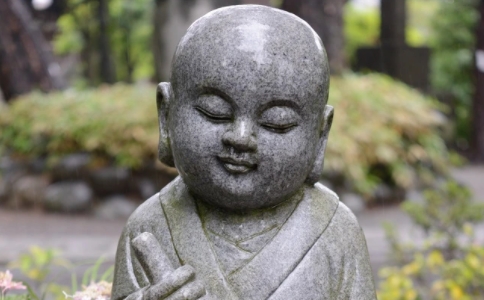
在社会上,确实有很多贡高我慢之人。有一点点学问的人,就认为自命不凡。其实学问多了又怎么样呢?徒增分别念而已。有一些人长得漂亮,就目空无人,其实你长得再美,青春都会老去。有些人,有钱有势就盛气凌人,其实这只是今天的努力。有些人哪怕是出家了,也很傲慢
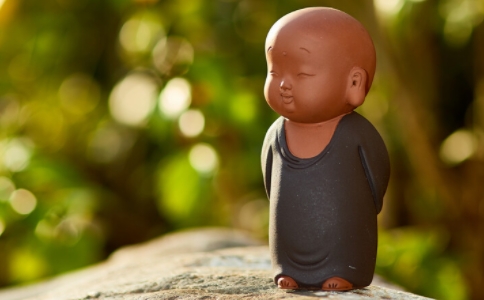
我们人有两个方向可以选择,一个选择向善向上,就是走向光明;一种就是走向堕落。我们每一个人都希望自己的生命是增上的,要往上走。所以我们就要找到一些方法来让我们的生命往上走。佛教把引导我们生命往上走的第一个基础就讲到五戒,五戒是通往人天的护照。如
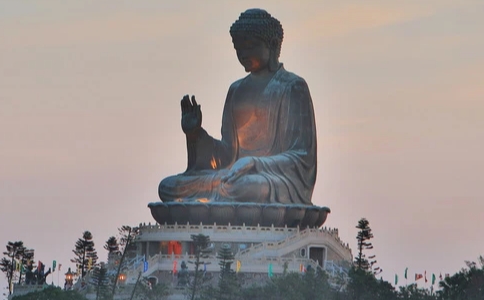
佛教以人的认识为中心,对世界一切现象分为根、尘、识三大类根,合称十八界,包括能发生认识功能的六根(眼根界、耳根界、鼻根界、舌根界、身根界、意根界),作为认识对象的六境(色尘界、声尘界、香尘界、味尘界、触尘界、法尘界),和由此生起的六识(眼识界、
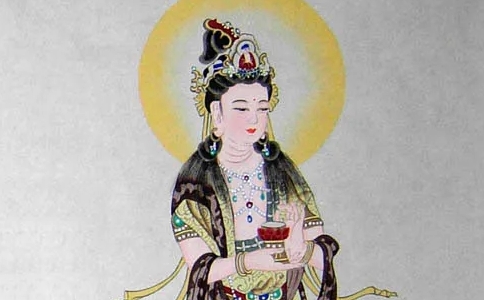
什么是幽冥菩萨戒?“幽冥菩萨戒”是在世人给过世亲人、祖先、冤亲债主等一切亡者,及孤魂所受持的菩萨戒律。由于他们生前曾造作恶业,现在堕落在恶道中受苦无尽,如果没有阳上亲人代他们超度,并受持菩萨戒律,就会永无出离之期。所以,受持幽冥菩萨戒就是阳上亲

弟子问:顶礼法师!请问法师第七识是什么?把阿弥陀佛名号和第七识绑在一起,是什么意思?一如法师解答:这个问题第七识是末那识,是什么识呢?他是一种我执的根本,就是我们凡夫众生生死的根本就是坚固的我执,但是坚固我执的根本原因就是第七木那识……

最初,梁武帝并不信仰佛教,但是当他登上了王位以后,他就改奉佛教了。当时,他下旨“舍道事佛”,并且要求群臣百官都“返伪就真,舍邪入真”。梁武帝推崇佛教可谓是不遗余力,在他的倡议下,佛教很快就进入了繁盛时期。在南朝时期,全国的寺院、僧尼数量也迅速增加起来,仅建康这个地方,就有五百多座寺院,十多万僧人。

在中国历史上,法显是第一位前往印度巡礼佛迹,求取经律,并且获得了巨大成就的中国僧人。东晋隆安三年(公元399年),他从长安出发,向西前行到达了巴连弗邑,他在这里停留了三年,求得了大量的经律论梵本,包括《萨婆多部律抄》、《摩诃僧只阿毗昙》等,后来,他又将这些经本传到了斯里兰卡。

简单地说,修行就是按照佛法来对自己的行为进行修正,要反思自己曾经的过错,要修正自己的心、口、意等。佛教修行的方法有很多,但最终的目的都是破邪显正,去妄存真。因为佛教认为,众生遭遇的苦难都来自于贪爱,如果希望能够离苦得乐,就必须对自己的思想和言行进行修正。

大约在公元前2000年,居住在东欧和中亚地区的雅利安人开始从兴都库什山和帕米尔高原入侵恒河流域,占领印度,并且创立了野蛮的种姓制度——婆罗门教。婆罗门教把人分为了四等,即婆罗门、刹帝利、吠舍、首陀罗。

悉答多王子得道成佛后,就动身去寻找侨陈如等五位侍者,他在鹿野苑里为他们开示说法,佛教史上将这称为“初转*轮”。
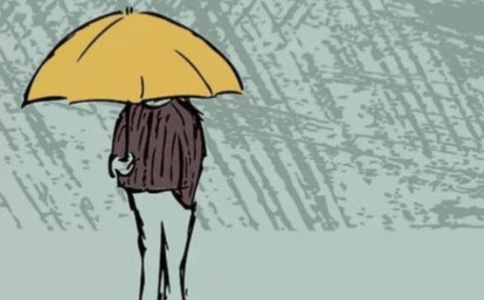
“我怎么什么都不会”“我怎么什么都做不好”。不知道从什么时候开始,焦虑成了人生的关键词。焦虑、不安、压力在现代人的生活中占据了很重要的位置,总结过去很焦虑,计划未来更焦虑……也许大多数人更多的是抱怨与逃避,而佛陀却早已教给我们,直面问题的智慧与勇气。

“我怎么什么都不会”“我怎么什么都做不好”。不知道从什么时候开始,焦虑成了人生的关键词。焦虑、不安、压力在现代人的生活中占据了很重要的位置,总结过去很焦虑,计划未来更焦虑……也许大多数人更多的是抱怨与逃避,而佛陀却早已教给我们,直面问题的智慧与勇气。
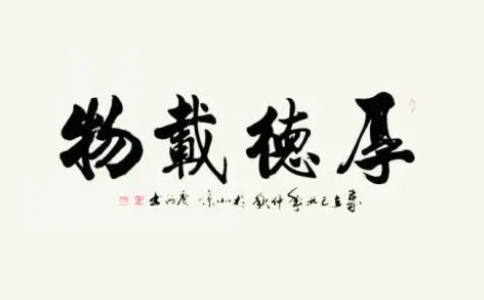
一、口德。得饶人处且饶人:1、直话:可以转个弯说。2、冷冰冰的话:可以加热了说。3、批评人的话:一对一的说,要顾及别人的自尊。二、掌德。赞美别人,学会鼓掌:1、每个人都需要来自他人的掌声。2、为他人喝彩是每个人的责任。3、给别人掌声其实是给自己掌声。

投子大同禅师与嵇山章禅师在室外品茶。大同禅师指着茶杯中倒映的青山绿树、蓝天白云说:“森罗万象,都在里边。”

僧璨禅师召集僧众,向他们宣讲佛法。有一小和尚,名道信,年方14,礼拜完僧璨禅师后问道:“什么是佛心?”禅师反问道:“你如今是什么心?”

道吾禅师带着弟子渐源到一信徒家诵经吊祭超度。渐源敲着棺木问师父:“棺木里的人是生?抑是死?”道吾:“不说生,不说死!”渐源:“为什么不说?”

石巩禅师一天问他的师弟西堂智藏说:“你能不能抓住虚空呢?”智藏回答:“能!”石巩就要智藏示范一下,智藏于是向空中抓了一把。

从前,无德禅师面前来了三位信徒,他们为各自的事情烦恼不已,不知道如何才能使自己快乐。禅师首先问他们:“你们为了什么而活着?”

唐朝江州刺史李渤,问智常禅师道:“佛经上所说的‘须弥藏芥子,芥子纳须弥’,未免失之玄奇了,小小的芥子,怎么可能容纳那么大的一座须弥山呢?过分不懂常识,是在骗人吧?”

一人问禅师:人的一生中哪一天最重要? 禅师不加思索答道:今天。 问:为什么?
赞助、流通、见闻、随喜者、及皆悉回向尽法界、虚空界一切众生,依佛菩萨威德力、弘法功德力,普愿消除一切罪障,福慧具足,常得安乐,无绪病苦。欲行恶法,皆悉不成。所修善业,皆速成就。关闭一切诸恶趣门,开示人生涅槃正路。家门清吉,身心安康,先亡祖妣,历劫怨亲,俱蒙佛慈,获本妙心。兵戈永息,礼让兴行,人民安乐,天下太平。四恩总报,三有齐资,今生来世脱离一切外道天魔之缠缚,生生世世永离恶道,离一切苦得究竟乐,得遇佛菩萨、正法、清净善知识,临终无一切障碍而往生有缘之佛净土,同证究竟圆满之佛果。
版权归原影音公司所有,若侵犯你的权益,请通知我们,我们会及时删除侵权内容!